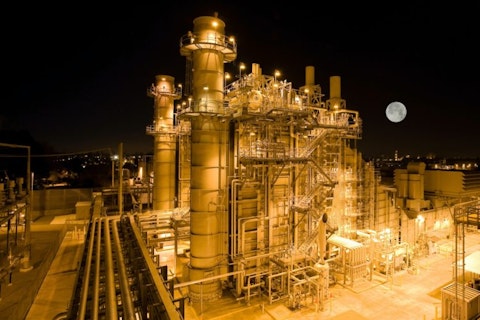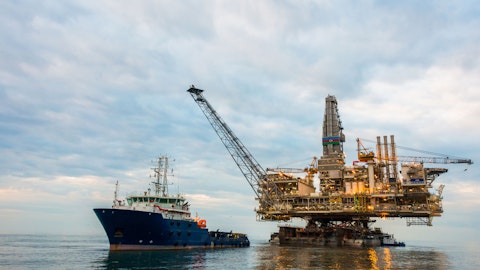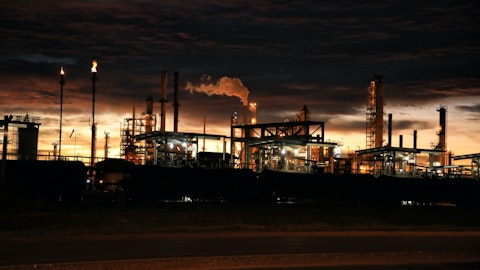Canadian Natural Resources Limited (NYSE:CNQ) Q2 2023 Earnings Call Transcript August 3, 2023
Canadian Natural Resources Limited beats earnings expectations. Reported EPS is $1.14, expectations were $0.88.
Operator: Good morning. We would like to welcome everyone to the Canadian Natural Resources’ 2023 Second Quarter Earnings Conference Call and Webcast. After the presentation, we will conduct a question-and-answer session; instructions will be given at that time. Please note that this call is being recorded today, August 3, 2023 at 9:00 a.m. Mountain Time. I would like to turn your meeting over to your host for today’s call, Lance Casson, Manager of Investor Relations. Please go ahead.
Lance Casson: Good morning, everyone. And thank you for joining Canadian Natural’s second quarter 2023 earnings conference call. As always, before we begin, I would like to remind you of our forward-looking statements, and it should be noted that in our reporting disclosures everything is in Canadian dollars, unless otherwise stated, and we report our reserves and production before royalties. Additionally, I would suggest you review our comments on non-GAAP disclosures in our financial statements. With me this morning and Tim McKay, our President; and Mark Stainthorpe, our Chief Financial Officer. Tim will first speak to how Canadian Natural is targeting strong production in the second half of 2023, following the completion of planned turnarounds and through our strategic growth plan.
Additionally, he will touch on some highlights of our ESG achievements from our 2022 stewardship report to stakeholders that was released today, followed by specifics on our safe, reliable, and world-class operations. Mark will then summarize our financial results, our strong financial position, free capital generation, and significant returns to shareholders so far this year. To close, Tim will summarize our call prior to opening up the line for questions. With that, I will turn it over to you, Tim.
Tim McKay: Good morning, everyone. In the second quarter, we achieved quarterly production of approximately 1.19 million BOEs/d day, which included natural gas production at approximately 2.1 BCF per day with liquids production at approximately 847,000 barrels a day, both reflecting the operational impacts of the wildfires in Western Canada, third party pipeline outage, as well as planned turnaround activities in the quarter. The wildfires in Western Canada resulted in some assets being shut in at various times through the months of May and into July. There is no significant damage to our assets and essentially all the production impacted by the wildfires has now been restored, and we continue to actively monitor the situation.
We’d like to thank our field personnel, their families, as well as first responders, emergency response agencies for their efforts over the past few months. As a result of strong execution on our thermal growth plan, Q3 2023 average thermal production is now targeted to be approximately 280,000 barrels a day, as well as Q4, which represents growth of approximately 30,000 barrels a day from Q4 2022 levels. As well, it’s well timed with Western Canadian Select pricing improving both year-to-date and forecasted to remain strong for the remainder of 2023. Following the completion of the planned turnarounds at both our world class Oil Sands Mining and Upgrading assets, production in July has been strong with a monthly average of approximately 513,000 barrels a day, capturing SEO pricing that continues to be priced at a premium to WTI.
Our 2023 capital budget has increased by about $200 million compared to the original budget. In particular, the oil sands mining and upgrading has increased by approximately $130 million, largely reflecting increased scope and third-party costs relating to sustaining [ph] activities to ensure safe and effective operations. The remaining approximately $70 million relates to the North American E&P and thermal operations as a result of increased non-op operated activities and increased workover activities on properties, as well as some inflationary pressures. The 2023 targeted capital program is approximately $5.4 billion or approximately a 4% increase. Canadian Natural continues to be a leader on environmental, social and governance, and has made it a priority to work collaboratively with the industry and peers and governments to achieve meaningful GHG reductions in support of both Alberta and Canada’s climate goals.
Today, our 2022 stewardship report to stakeholders was released, which highlights several of our ESG accomplishments, including top tier safety performance working together with 167 indigenous businesses, in which approximately $684 million in contracts were awarded in 2022. Additionally, we are an investment leader in R&D as we increased investment by 30% over 2021 levels, with over $587 million invested in technology, development, deployment, focusing our reductions in – reducing our environmental footprint, including greenhouse gas emissions and productivity improvements. I will now do a brief overview of our assets starting with natural gas. Overall, Q2 2023 natural gas pro production was approximately 2.1 Bcf, which was comparable to Q2 2022 production.
For North American operations Q2 2023 production was slightly down at approximately 2.07 Bcf, versus a Q2 2022 production of 2.09 Bcf, primarily a result for the wildfires, the third-party outage impact in the quarter by approximately a 100 million cubic feet per day offset by our company’s drill to fill strategy, adding low cost, high value, liquid rich, natural gas production volumes. During the quarter company drilled 21 net wells of which 6.5 were brought on during the quarter meeting targeted rates. Our North American Q2 2023 gas operating costs was a $1.35 and Mcf, which is up 17% compared to Q2 2022 of a $1.15, primarily due higher service than power costs, as well as the impact of lower production volumes resulting from the wildfires and the third-party outage.
Our teams continue to focus on cost control and operational excellence. For North American light oil and NGLs Q2 production was 102,553 barrels a day down from Q2 2022 of 109,907 barrels a day, primarily as a result of the wildfires and third party outages impacting liquids production by approximately 7,600 barrels a day for the quarter. Q2 2023 operating costs were $18.03 up from Q2, operating costs of $15.19, reflecting the impact of higher service, and power costs and lower volumes, due to the wildfires and third party outage. Our international assets in Q2 had oil production of 26,520 barrels a day, which is comparable to Q2 2022 levels of 25,907 barrels a day. Our international assets continue to generate good cash flow and value to the company.
Moving to heavy oil production was 76,498 barrels a day in Q2 2023, up 15% from Q2 2022 of 66,521 barrels a day, primarily due to strong drilling results offsetting natural field declines. Operating costs in Q2 were at $20.07 down 12% as compared to Q2 2022 operating costs of $22.86, primarily due to lower natural gas fuel cost. During the quarter, the company drilled 24 net heavy oil wells, of which 18 wells were multilaterals across our land base from Bonnyville to Lloydminster and to the Clearwater area, as well as slant lap wells, which all results of our untargeted to budgeted rates. A key proponent of our long life low decline assets is a world-class Pelican Lake pool, where our leading-edge polymer flood continues to deliver significant value.
Q2 2023 production was 47,151 barrels a day down 8% versus Q2 2022 average of 51,112 barrels a day, reflecting the natural decline nature of the property, as well as the polymer injection rates that were reinstated in February, 2023. The field is targeted to return to its historical decline rate of approximately 5% in the latter half of 2023. The team continues to focus on mitigating cost pressures with Q2 2023 operating costs of $8.55 per barrel, an increase from our Q2 2022 operating costs of $7.99 per barrel, reflecting higher service and power costs, as well as lower production volumes. With our low decline and very low operating costs, Pelican Lake continues to have excellent net backs. In our thermal in estuaries in Q2 2023 we continue to leverage our continuous improvement culture, our expertise to deliver effective and efficient operations.
Q2 2022 production was 238,941 barrels a day, down from Q2 2022 production of 249,938 barrels a day as forecasted as a result of the planned turnaround at Primrose. Q2 operating costs were $14.59 per barrel, down approximately $4 when compared to Q2 2022 operating costs of $18.93, largely a result of lower natural gas costs. I’ll now update our thermal growth plans. At Primrose the company is targeting to grow production by approximately 25,000 barrels a day, primarily from its two new CCS pads; C-S-S pads drilled in 2022. The production from these new pads which targets strong quarterly production of approximately 100,000 barrels a day for this area in the third and fourth quarter. At Kirby, the company is targeting to grow production by approximately 15,000 barrels a day from Q4 2022 levels to approximately 65,000 barrels a day in Q4 2023, as the company progressed the development of the four SAGD pads in 2023.
The three remaining pads are targeted to ramp up to full production capacity over the first nine months of 2024 at a pace of one-pad per quarter. At Jackfish, production has been very strong averaging approximately 113,000 barrels a day with minimum growth to capitals since acquiring the asset. Representing its long life low decline nature, production from these new pads are targeted to ramp up to their full production capacities in Q3 2024 and Q4 of 2024 respectfully supporting continued high utilization rates at Jackfish. Thermal in situ production is target to increase in the second half of 2023, averaging approximately 280,000 barrels a day, and with the strip WCS differentials it’ll add incremental cash flow. In the company’s world class Oil Sands Mining and Upgrading assets we had Q2 production averaging 355,246 barrels a day of SCO.
As previously announced the plan turnaround activities at the non-operated Scotford Upgrader and Horizon as well as Horizon we’re completed with Q2 operating costs that were $31.28 per barrel. Following the completion of the planned turnarounds at our World Class Mining and Asset Upgrade, production in July has been very strong. It’s a monthly average of approximately 513,000 barrels a day, capturing strong SCO pricing. At Horizon during the planned turnaround, and as part of his reliability enhancement project, the company completed two tie-in – two tie-in of two furnaces. In August, both furnaces are targeted to be operational, increasing SCO production capacity by approximately 5,000 barrels a day, which is included in our company’s 2023 production guides.
The reliability enhancement project is targeted to add approximately 14,000 barrels a day of additional SCO capacity in 2025 as a result of shifting the maintenance schedule from once per year to once every two years, reducing downtime for maintenance activities and increasing overall reliability at Horizon. I’ll now turn it over to Mark for a financial review.
Mark Stainthorpe: Thanks Tim, and good morning everyone. In the second quarter of 2023, we generated strong financial results with adjusted funds flow of $2.7 billion and adjusted net earnings from operations of $1.3 billion, while major turnaround activity was completed in the quarter. Balanced allocation to our four pillars continues, including significant returns to shareholders in the quarter and so far this year. Up to and including August 2, 2023 year-to-date returns to shareholders totaled $4.3 billion, including $2.9 billion in dividends and $1.4 billion in share repurchases. Our commitment to increasing shareholder returns is evident in our sustainable and growing quarterly dividend, which was increased to $0.90 per share from $0.85 per share earlier this year, marking 2023 as the 23rd consecutive year of dividend increases.
Subsequent to quarter-end, the Board has declared a quarterly dividend of $0.90 per share payable on October 5, 2023. As planned maintenance activities were completed in Q2, we are targeting strong production volumes and free cash flow for the second half of 2023 as we move towards our $10 billion net debt level. We’re 100% of free cash flow will be allocated to shareholders as defined in our policy. And of note, the second quarter marked the six-year anniversary since the acquisition of 70% of the AOSP. Assets as part of the acquisition, we issued 97.6 million shares. Shareholder returns through share repurchases since closing has been significant, resulting in a reduction of approximately 123 million shares, or 10% to less than 1.1 billion shares outstanding as at June 30, 2023; fewer shares outstanding than before the acquisition.
Additionally, total corporate production has grown by roughly 50% or 442,000 BOEs a day when comparing Q1 2017 to Q1 2023. And since closing the acquisition, we have reduced debt by over $11 billion or about 50% significantly reducing our overall risk profile. This demonstrates our focus on safe, reliable production, a strong financial position and our culture of continuous improvement. Finally, we’re in a very strong financial position with debt-to-EBITDA at 0.7 times at the end of the quarter, and we continue to maintain strong liquidity; including revolving bank facilities, cash and short-term investments, liquidity at the end of Q2 was approximately $5.6 billion. When you combine our leading financial results with our top tier reserves and asset base, this provides us with competitive advantages in terms of capital efficiency, flexibility and sustainability, all of which drive material free cash flow generation and strong returns on capital.
With that, I’ll turn it over to you, Tim, for some final comments.
Tim McKay : Thanks Mark. Canadian Natural’s advantage is our ability to effectively allocate cash flow to our four pillars. We have a well-balanced, diverse, large asset base, which is significant portion is long life, low decline assets will require less capital to maintain volumes. We continue to allocate cash flow to our four pillars in a disciplined manner to maximize value for our shareholders, which is all driven by effective capital allocation, effective and efficient operations, and our teams who deliver top tier results. We have robust, sustainable free cash flow and through our free cash flow allocation policy returns to shareholders are significant, which includes our growing dividend, which has increased for 23 consecutive years.
In summary, we continue to focus on safe, reliable operations, enhancing our top tier operations and will continue to drive our environmental performance. We are in a very strong position, and being nimble enhances our capacity to create value for our shareholders. We continue to apply that same drive to ESG, environmental social and governance, a significant factor in our long-term sustainability. As we move forward to our lower – our carbon emissions with our first target to reduce absolute Scope 1 and Scope 2 emissions by 40% by 2035; from our 2020 baseline. On our journey to achieve our goal of net zero GHG in Oil Sands by 2050. Canadian Natural is delivering top tier free cash flow generation, which is unique, sustainable, robust and clearly demonstrates our ability to both economically grow the business, deliver returns to shareholders by balancing our four pillars.
With that, I will open the call to questions.
See also 11 Cheap Lithium Stocks To Buy and 25 Most Fun Countries in the World.
Q&A Session
Follow Canadian Natural Resources Ltd (NYSE:CNQ)
Follow Canadian Natural Resources Ltd (NYSE:CNQ)
Receive real-time insider trading and news alerts
Operator: Thank you. [Operator Instructions] First question comes from Greg Pardy at RBC Capital Markets. Please go ahead.
Greg Pardy: Yes, thanks. Good morning. Thanks for the rundown guys. Couple questions for me; maybe to start Mark, maybe just on the net debt side, have you got a reasonable shot at getting to $10 billion by the end of this year based upon what you see in the production, but also the commodity price landscape?
Mark Stainthorpe: Yes. Greg, thanks for the question. It’s – it is very dependent on those commodity prices, so if you do see some strength in the commodity prices towards the end of the year, I think there is a possibility we could get there at the end. I think with recent strip pricing, I’ve forecasted to be still very early 2024.
Greg Pardy: Okay. Okay. Conservative – yeah, conservatives as we like; and then maybe just shifting gears over to Tim, I wanted to dig into the, just the 513,000 that you put up at Horizon AOSP, but maybe a little bit more in terms of reminding us what the capacity is now across the combined asset? And then perhaps how we should be thinking about operating cost on a go forward basis?
Tim McKay: Yes. Greg, good questions here. So, I mean with Horizon and AOSP, obviously the teams continue to work on opportunities to increase reliability and obviously deliver safe and effective operations there. So with that during the turnaround there was increased scope in terms of work that we felt needed to be done on the Upgrader and I’m actually very proud of our teams in terms of the effort, the way they approached it and dealt with all the work that needs to be done with that asset. So we’ve seen a little bit of inflationary pressures but in general, I think we’re on the right track in terms of making sure that those assets run reliably and consistently each and every day. In terms of capacities, Horizon on a capacity day is pretty well kind of in that 280 [ph], maybe a little bit more here, we’ll see with the new furnaces.
They are forecasted or targeted to come on in the next couple weeks, so that will be a great test for us in terms of seeing that increase. And AOSP obviously we’ve been creeping it up over time and really it’s been doing a little bit better than its capacity here of flight. So I think it’s really early here that the numbers look really strong here for July. I’d like to get through July and into August more and we’ll see if we can keep that sustained rate. It’s really, really positive; both sites have done a really good job here coming out of the turnarounds.
Greg Pardy: Okay. Thanks to both.
Operator: Thank you. The next question comes from Manav Gupta at UBS. Please go ahead.
Manav Gupta: Guys just wanted to get some clarifications. You generally have a very informed view of apportionments, differentials and if you could also help us understand from the perspective of the TMX startup; how you’re thinking about it?
Tim McKay: Sure. As far as apportionment we don’t see it being an issue. From all indications TMX is – will be making a call for line fill here in the fall here, August, September, October. So from that aspect I look at it as a very positive and very constructive for Canada’s Oil WCS because if you can appreciate one, you’ll have the line fill, and I believe it’s up around 5 million barrels of line fill for that line. And then on top of it, the heavy oil capacity, I believe is a little over 500,000 barrels a day. So it’s going to take 500,000 barrels a day of heavy to a different market. So to me, I find that the WCS piece will be very constructive here. Obviously, typically, historically the winter months it does widen a bit, but I mean, let’s face it, it’s 20% that is still very strong on a relative basis.






